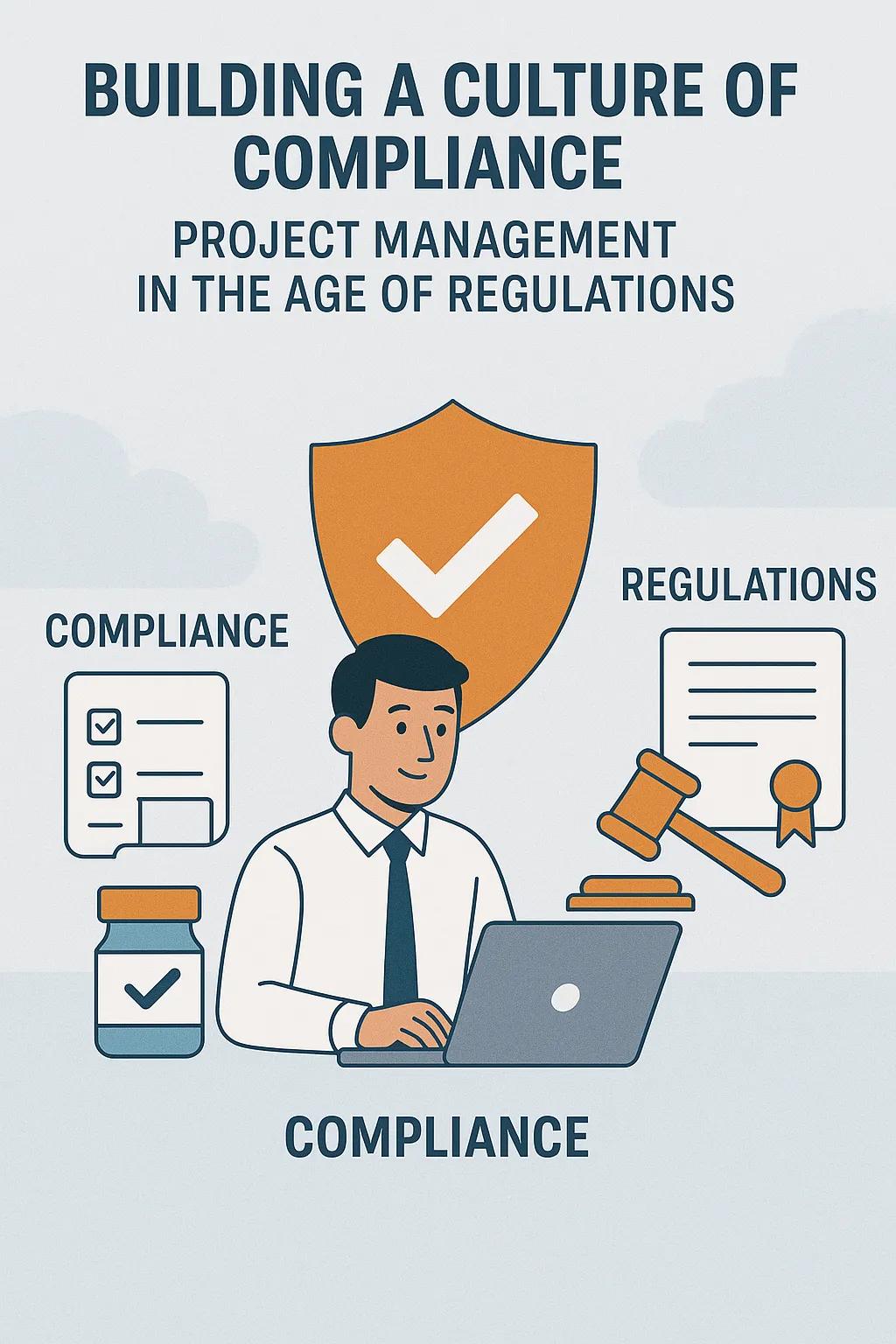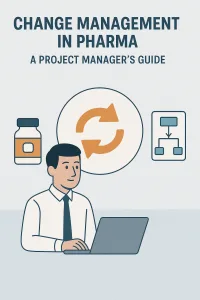Introduction
In the pharmaceutical industry, the role of a project manager is pivotal in navigating the complex landscape of regulatory compliance. Project managers are responsible for overseeing projects from inception to completion, ensuring that they adhere to stringent regulatory requirements while also meeting quality standards and deadlines. Their responsibilities extend beyond mere project execution; they must also manage cross-functional teams, allocate resources effectively, and maintain comprehensive documentation to ensure compliance with industry regulations [2][5].
The regulatory landscape in the pharmaceutical sector is continually evolving, with increasing scrutiny from regulatory bodies. This heightened focus on compliance necessitates that project managers not only understand the regulations but also integrate them into every aspect of project management. As organizations strive to improve efficiencies and maintain compliance, project managers face challenges such as resource limitations and the need for effective communication across diverse teams [3][7]. The implications of these regulations are profound, as non-compliance can lead to significant financial penalties, project delays, and reputational damage.
To address these challenges, fostering a compliance-centric culture within project teams is essential. A compliance-centric culture emphasizes the importance of adhering to regulations and quality standards at every stage of a project. This culture encourages open communication, accountability, and a shared commitment to compliance among all team members. By instilling this mindset, project managers can ensure that compliance is not viewed as a mere checkbox but as an integral part of the project lifecycle [6][8].
Understanding Compliance in the Pharmaceutical Industry
In the pharmaceutical industry, compliance is not just a regulatory requirement; it is a critical component that ensures the safety, efficacy, and quality of products. Project managers play a pivotal role in fostering a culture of compliance, which is essential in navigating the complex landscape of regulations. Here are some key points to consider:
Overview of Key Regulations
- FDA (Food and Drug Administration): The FDA oversees the safety and efficacy of drugs and medical devices in the United States. Compliance with FDA regulations is crucial for project managers to ensure that products meet the required standards before they reach the market.
- EMA (European Medicines Agency): Similar to the FDA, the EMA is responsible for the scientific evaluation, supervision, and safety monitoring of medicines in the European Union. Understanding EMA guidelines is essential for project managers working on international projects.
- ICH Guidelines (International Council for Harmonisation): These guidelines aim to ensure that pharmaceutical products are developed and registered in a consistent manner across different regions. Project managers must be familiar with ICH guidelines to align their projects with global standards.
Importance of Good Manufacturing Practices (GMP) and Good Clinical Practices (GCP)
- Good Manufacturing Practices (GMP): GMP regulations ensure that products are consistently produced and controlled according to quality standards. Project managers must implement GMP throughout the project lifecycle to minimize risks and ensure product quality.
- Good Clinical Practices (GCP): GCP is an international quality standard that ensures the ethical and scientific quality of clinical trials. Project managers must ensure that all clinical trials comply with GCP to protect the rights and welfare of trial participants and to ensure the integrity of the data collected.
Consequences of Non-Compliance
- Financial Consequences: Non-compliance can lead to significant financial penalties, including fines and increased costs associated with product recalls or rework. This can severely impact a company’s bottom line and project budgets.
- Legal Consequences: Companies may face legal actions, including lawsuits and sanctions, if they fail to comply with regulatory requirements. This can result in lengthy litigation processes and additional costs.
- Reputational Consequences: Non-compliance can damage a company’s reputation, leading to a loss of trust among stakeholders, including customers, investors, and regulatory bodies. A tarnished reputation can have long-lasting effects on a company’s market position and future projects.
The Role of Project Managers in Ensuring Compliance
In the pharmaceutical industry, project managers play a pivotal role in fostering a culture of compliance, which is essential for navigating the complex regulatory landscape. Their responsibilities extend beyond traditional project management tasks, as they must integrate compliance into every aspect of their project management practices. Here are key points on how project managers can effectively ensure compliance:
- Setting Clear Compliance Objectives in Project Planning: At the outset of any project, it is crucial for project managers to establish clear compliance objectives. This involves identifying relevant regulations and standards that must be adhered to throughout the project lifecycle. By integrating these compliance goals into the project planning phase, project managers can ensure that all team members understand the importance of compliance from the very beginning [2][15].
- Communicating Compliance Expectations to the Project Team: Effective communication is vital in ensuring that compliance expectations are understood and embraced by the project team. Project managers should articulate the specific compliance requirements and the rationale behind them, fostering an environment where team members feel responsible for upholding these standards. Regular meetings and updates can help reinforce these expectations and keep compliance at the forefront of the team’s efforts [3][4].
- Monitoring Compliance Throughout the Project Lifecycle: Continuous monitoring of compliance is essential to identify and address any potential issues before they escalate. Project managers should implement regular compliance checks and audits, ensuring that all project activities align with established regulations and standards. This proactive approach not only mitigates risks but also reinforces a culture of accountability within the team [1][8].
By focusing on these key areas, project managers in the pharmaceutical industry can significantly contribute to building a compliance-centric culture. This not only enhances the integrity of the projects they oversee but also supports the overall mission of delivering safe and effective pharmaceutical products to the market.
Fostering a Culture of Compliance
In the pharmaceutical industry, where regulations are stringent and the stakes are high, fostering a culture of compliance is essential for project managers. This culture not only mitigates legal risks but also enhances the overall efficiency and integrity of project execution. Here are several strategies that project managers can implement to cultivate a compliance-centric environment:
- Encouraging Open Communication about Compliance Issues: Project managers should create an atmosphere where team members feel comfortable discussing compliance-related concerns without fear of repercussions. This can be achieved through regular meetings, anonymous reporting channels, and open-door policies. By promoting transparency, project managers can identify potential compliance issues early and address them proactively, thereby reducing the risk of violations and fostering a sense of shared responsibility among team members [2][4].
- Implementing Training and Development Programs Focused on Compliance: Continuous education is vital in the ever-evolving landscape of pharmaceutical regulations. Project managers should invest in comprehensive training programs that cover relevant laws, regulations, and best practices. These programs should not only focus on compliance requirements but also emphasize the importance of ethical behavior and decision-making. By equipping team members with the necessary knowledge and skills, project managers can ensure that compliance becomes an integral part of the organizational culture [2][6].
- Recognizing and Rewarding Compliance-Oriented Behaviors: To reinforce a culture of compliance, project managers should acknowledge and reward behaviors that align with compliance goals. This could include recognizing individuals or teams that demonstrate exceptional adherence to regulations or who proactively address compliance challenges. By celebrating these achievements, project managers can motivate others to prioritize compliance in their daily activities, creating a positive feedback loop that strengthens the overall culture [1][3].
By implementing these strategies, project managers in the pharmaceutical industry can effectively foster a culture of compliance that not only meets regulatory requirements but also enhances the integrity and success of their projects. This proactive approach to compliance will ultimately lead to better risk management, fewer disruptions, and a more resilient organization [1][4].
Tools and Technologies to Support Compliance
In the pharmaceutical industry, where regulatory requirements are stringent and constantly evolving, project managers play a crucial role in fostering a culture of compliance. Leveraging the right tools and technologies can significantly enhance compliance tracking, reporting, and risk management. Here are some key points to consider:
Overview of Software Tools for Compliance Tracking and Reporting
Project managers can utilize various electronic quality management systems (eQMS) to streamline compliance processes. These systems help maintain accurate records, manage documentation, and generate reports that demonstrate adherence to industry standards and regulations. By automating compliance tasks and deadlines, project managers can avoid regulatory penalties and ensure timely submissions to authorities such as the FDA and EMA [1][2].
Additionally, specialized project management software, augmented by governance, risk, and compliance (GRC) capabilities, can provide a comprehensive view of compliance-related activities. Tools like Epicflow are designed to help pharmaceutical companies manage resources effectively, address risks, and streamline project workflows, ensuring that compliance remains a priority throughout the project lifecycle [5][9].
Role of Data Analytics in Identifying Compliance Risks
Data analytics plays a pivotal role in identifying potential compliance risks before they escalate into significant issues. By analyzing historical data and current project metrics, project managers can uncover patterns that may indicate compliance vulnerabilities. This proactive approach allows for timely interventions and adjustments to project plans, thereby enhancing overall compliance [3][4].
Moreover, advanced analytics can support decision-making by providing insights into compliance trends and helping project managers prioritize areas that require immediate attention. This data-driven strategy not only mitigates risks but also fosters a culture of accountability and transparency within project teams.
Integrating Compliance Management Systems into Project Workflows
Integrating compliance management systems into existing project workflows is essential for ensuring that compliance is not an afterthought but a fundamental aspect of project execution. Tools like KanBo support structured workflows that are critical in the highly regulated pharmaceutical industry, where compliance, traceability, and documentation are paramount [13].
Regular project reviews, compliance check-ins, and audits should be embedded into the project management process. For instance, scheduling monthly compliance timeouts during project meetings allows compliance officers to verify that all regulatory documentation is up-to-date and complete [15]. This integration not only reinforces the importance of compliance but also empowers project managers and teams to take ownership of their compliance responsibilities.
Challenges in Building a Compliance-Centric Culture
In the pharmaceutical industry, project managers play a crucial role in fostering a culture of compliance amidst a landscape of stringent regulations and evolving standards. However, several challenges can impede their efforts in establishing this compliance-centric culture. Here are some key obstacles project managers may face:
- Resistance to Change Within the Organization: One of the most significant hurdles is the inherent resistance to change that often exists within organizations. Employees may be accustomed to established workflows and may view new compliance measures as disruptive. This resistance can stem from a lack of understanding of the importance of compliance or fear of increased workload. Project managers must navigate this resistance by effectively communicating the benefits of compliance and involving team members in the change process to foster buy-in and support [10][11].
- Balancing Compliance with Project Goals and Timelines: Project managers frequently find themselves in a delicate balancing act between adhering to compliance requirements and meeting project deadlines. The pressure to deliver results can lead to shortcuts that compromise compliance, which can have serious repercussions, including financial penalties and reputational damage. It is essential for project managers to integrate compliance into the project planning phase, ensuring that timelines account for necessary compliance activities without sacrificing project objectives [4][14].
- Dealing with Complex Regulatory Environments Across Different Regions: The pharmaceutical industry is characterized by a complex web of regulations that can vary significantly across different regions. Project managers must stay informed about these diverse regulatory requirements, which can be overwhelming. This complexity can lead to confusion and misalignment within project teams, making it challenging to maintain a consistent compliance approach. To address this, project managers should invest in training and resources that enhance their team’s understanding of regional regulations and promote a unified compliance strategy [12][15].
By recognizing and addressing these challenges, project managers in the pharmaceutical industry can better foster a culture of compliance that not only meets regulatory demands but also supports the overall success of their projects.
Conclusion
In the pharmaceutical industry, project managers play a pivotal role in fostering a culture of compliance that is essential for navigating the complex regulatory landscape. Their responsibilities extend beyond traditional project management tasks; they are instrumental in ensuring that compliance is integrated into every phase of a project. By actively identifying and addressing regulatory requirements, project managers can significantly reduce the risk of costly violations and enhance the overall efficiency of business processes [5][10].
A compliance-centric culture not only safeguards against regulatory pitfalls but also contributes to project success in several ways:
- Enhanced Risk Management: By embedding compliance into project planning, managers can proactively identify potential risks and implement measures to mitigate them, leading to smoother project execution [3][12].
- Improved Collaboration: A culture that prioritizes compliance encourages open communication and collaboration among cross-functional teams, which is vital for the successful development and delivery of new drugs [12][14].
- Increased Trust and Accountability: When compliance is a shared value, it fosters trust among team members and stakeholders, ensuring that everyone is aligned towards common goals [15].
As we move forward in an increasingly regulated environment, it is crucial for compliance officers and project managers to work hand-in-hand. By collaborating effectively, they can create a robust framework that not only meets regulatory standards but also drives project success. This partnership is essential for building a resilient organization that can adapt to changing regulations while maintaining high standards of quality and safety in pharmaceutical development.
In conclusion, fostering a compliance-centric culture is not just a regulatory requirement; it is a strategic advantage that can lead to sustainable success in the pharmaceutical industry. Compliance officers and project managers must unite their efforts to cultivate this culture, ensuring that compliance becomes an integral part of every project’s DNA.
Find out more about Shaun Stoltz https://www.shaunstoltz.com/about/.
This post was written by an AI and reviewed/edited by a human.



